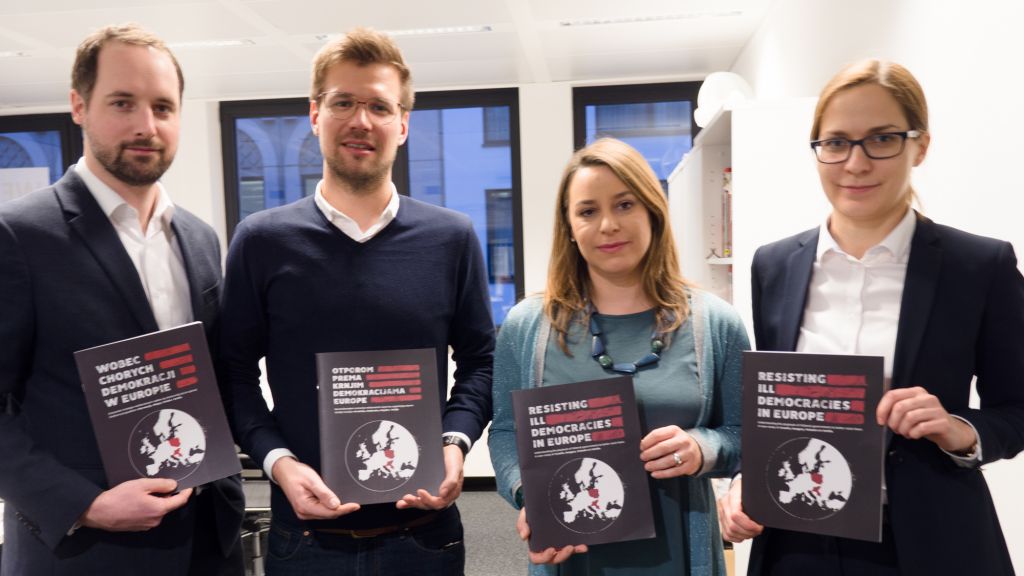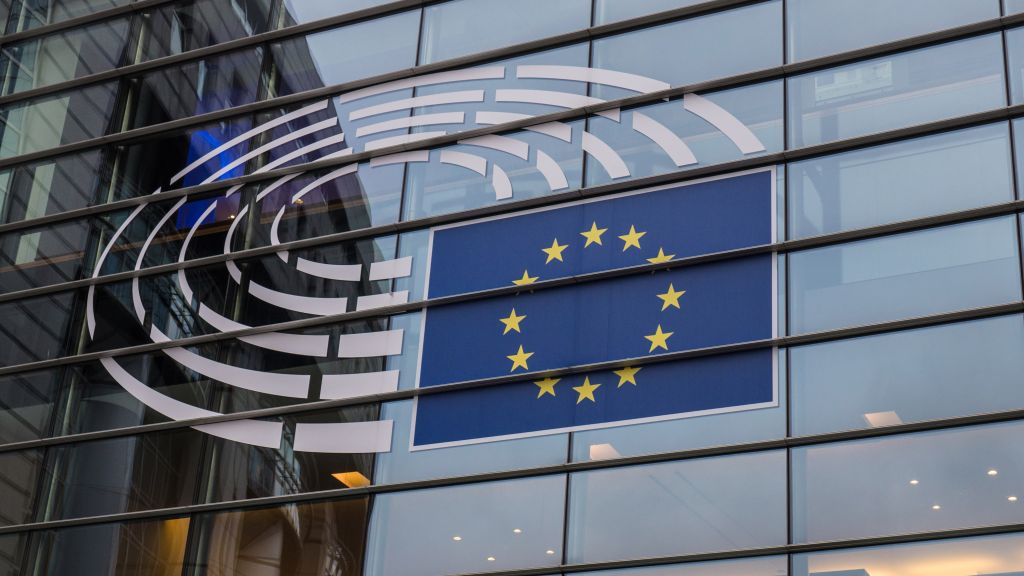They called strongly for the EU to be principled in addressing member state governments that attack the rule of law.
The NGOs publishing the case study – Human Rights Houses, Human Rights House Foundation, and partners from Hungary – have already held events in Warsaw and Zagreb, and will hold another in Budapest on 24 January.
Resisting Ill Democracy in Europe details the rise of illiberal governments in EU countries – for six months in Croatia, and still in power in Hungary and Poland. It includes in-depth research into the “playbook” of illiberal governments in these three countries, as well as in Serbia, but the aim is broader: to identify common trends within ill democracies and offer practices and strategies for civil society and others to resist them.
“There is a desperate need for the EU to start recognising the problems faced by civil society organisations,” said Malgorzata Szuleka, Helsinki Foundation for Human Rights, during the discussion.
Referring to Poland, she highlighted the essential role played by civil society organisations in safeguarding the rule of law and human rights, but also how they are among the first victims of the rule of law crisis and easy targets for the government to cut their funding and deny them access to the democratic process.
As detailed in the case study, this targeting of civil society is sadly a common trend in ill democracies.
An international issue
Speaking at the European Parliament, and joined by MEPs, human rights defenders from the three countries made it clear that ill democracy is an international issue, and one to which the EU must respond.
Sophie in ’t Veld, MEP ALDE and co-sponsor of the event, pointed towards cooperation among illiberal governments and politicians, with influence coming from countries such as Russia. She said: “Ill democracies are not national phenomena… there is a clear, well-defined, organised, funded, coherent political agenda.”
This point was to the core of many of the interventions at the event: ill democracies are not isolated situations or national peculiarities; they are part of wider cooperation and a trend that undermines the rule of law and human rights, on a path toward authoritarianism.
Cooperation among ill democracies is not based on aspects such as culture or geography, according to MEP In ’t Veld, who stated: “There’s not a political divide, a national divide, an east-west divide. The only divide here is people standing up for liberal democracy, rule of law, and fundamental rights, and the others who believe in authoritarian ruling and taking rights away from people… It’s not about traditional values; it’s about authoritarianism.”
Sophie in ’t Veld on the European Union response to ill democracy.
Defining ill democracy
As the NGOs publishing the case study explain in their fact sheet, an “ill democracy” is a country in which the government, through abusing its majority, manipulates legislative norms and impedes the functioning of democratic institutions, and threatens the independence of democratic pillars. They are governments that limit the right to exercise core freedoms with the aim of suppressing those who raise critics, in order to protect their own interests and their majorities.
Ill democracy in Croatia, Hungary, and Poland
At the event, human right defenders presented the situation with regard to ill democracy in their countries, and gave an update on what has happened since August 2017, the cut-off point for inclusion in the case study.
 From left: Florian Irminger (HRHF), Ivan Novosel, Marta Pardavi, and Malgorzata Szuleka.
From left: Florian Irminger (HRHF), Ivan Novosel, Marta Pardavi, and Malgorzata Szuleka.
Ivan Novosel, Human Rights House Zagreb, called for the current government to repair what was damaged during the six months of the HDZ-MOST coalition. This government faced a reactive civil society, media, and the wider population, with protests beginning on the first day of the new government, 22 January 2016. The coalition was dissolved in July 2016, sparking new elections.
This follows one of the main recommendations of the case study: that all stakeholders need to restore what illiberal governments have broken, but more immediately they need to stop further deterioration, which would lead ill democracies to not be democracies at all anymore.
With Poland and Hungary, the focus remains very much on stopping deterioration.
“Dialogue between civil society and the government is impossible today in Hungary,” warned Marta Pardavi, Hungarian Helsinki Committee, as she gave an account of the measures taken by the Hungarian government against independent human rights organisations.
To counter this, she called on the EU to put “its money where its mouth is” and support human rights organisations within member states.
This comes as more and more countries, particularly in Europe, are adopting restrictive and stigmatising laws and practices that hinder foreign funding for civil society. These practices originated in authoritarian states such as Belarus and Russia, but are being adopted by illiberal governments.
Pardavi explained that the delayed reaction by the EU to the situation in Hungary – due to disbelief this was happening in Europe – has allowed other countries to follow suit. This point is echoed in the case study, which calls for firm reactions early on in order to stem the tide of illiberalisation and to avoid situations of “too little, too late.”
Against Poland, the European Commission recently launched proceedings under Article 7 of the EU treaties, for the risk of a serious breach of the EU’s democratic values.
Malgorzata Szuleka said of this: “While this motion was submitted by the European Commission, responsibility is now shared by every member state… They must recognise the scope of the problem and the risks it poses to the European Union.”
For more than two years, international institutions have been rebuffed in their attempts to enter into a dialogue with Poland and engage constructively on the rule of law.
“We don’t question right of democratically elected governments to introduce reforms, but these need to be in line with the constitution, the rule of law, and human rights,” Szuleka concluded.
Frank Engel, MEP EPP and co-sponsor of the event, furthered this point, saying: “Elections are there to change policy, not to change the nature of the state.”
European political parties must respond
As illustrative of some of the challenges for European political parties in addressing ill democracy, the EPP group of which Engel is a member includes Viktor Orbán’s ruling Fidesz party.
This issue comes to the fore in the case study, which calls for political parties at the European level to equip themselves to address ruling majorities in European countries. It states that undermining the rule of law and the balance of powers, and eroding human rights, is not on any of the European parties’ platforms. When such developments happen, illiberal governments need to be held accountable by their own parties, not protected purely for partisan reasons at the expense of human rights.
It should be noted that Engel’s contributions to the discussion were far from protective of Viktor Orbán and his government.
Never too late
Sophie in ’t Veld claimed that it was never too late for the EU to respond, and spoke on what form this should take: “We call ourselves a community of values… but the response to the rise of populist movements that do not accept those values has been technocratic… The EU has to promote its agenda of values.”
Ivan Novosel, Marta Pardavi, and Malgorzata Szuleka set out the need for an EU response to ill democracy and consider what form this should take:
Croatian MEP Jozo Radoš in his intervention suggested that the final goal for the EU should be to establish an instrument to identify anti-democratic trends in EU member states.
This is also in line with the case study, which calls for the establishment of such an instrument to inform early action, recommending that the EU could rely more on UN mechanisms, its special procedures or treaty bodies, as well as the Human Rights Commissioner of the Council of Europe. All of these mechanisms have warned about developments in Hungary and Poland for some time.
For more details of the discussion, watch the full Facebook live recording.
The case study is available in English, Croatian, Hungarian, Polish, and Russian (Serbian version will be published soon.)
Documents:
-
- Factsheet: Resisting Ill Democracy in EuropeRead the fact sheet for an introduction to report a summary of the findings.
- Resisting Ill Democracies in Europe (English)Identifying the main trends within ill democracies, and offering practices and strategies for civil society to resist.
- Resisting Ill Democracies in Europe (Croatian)
- Resisting Ill Democracies in Europe (Hungarian)
- Resisting Ill Democracies in Europe (Polish)
- Resisting Ill Democracies in Europe (Russian)
Organisations publishing the case study
The case study Resisting Ill Democracies in Europe is published by the Centre for Peace Studies (Croatia),Helsinki Foundation for Human Rights (Poland), Hungarian Civil Liberties Union, Hungarian Helsinki Committee, Yucom – Lawyers’ Committee for Human Rights (Serbia), Human Rights House Zagreb, and Human Rights House Foundation.





